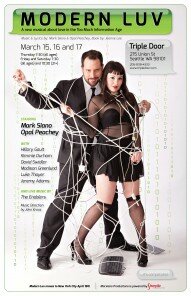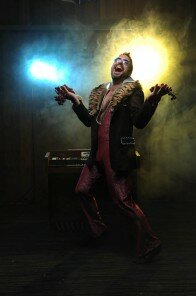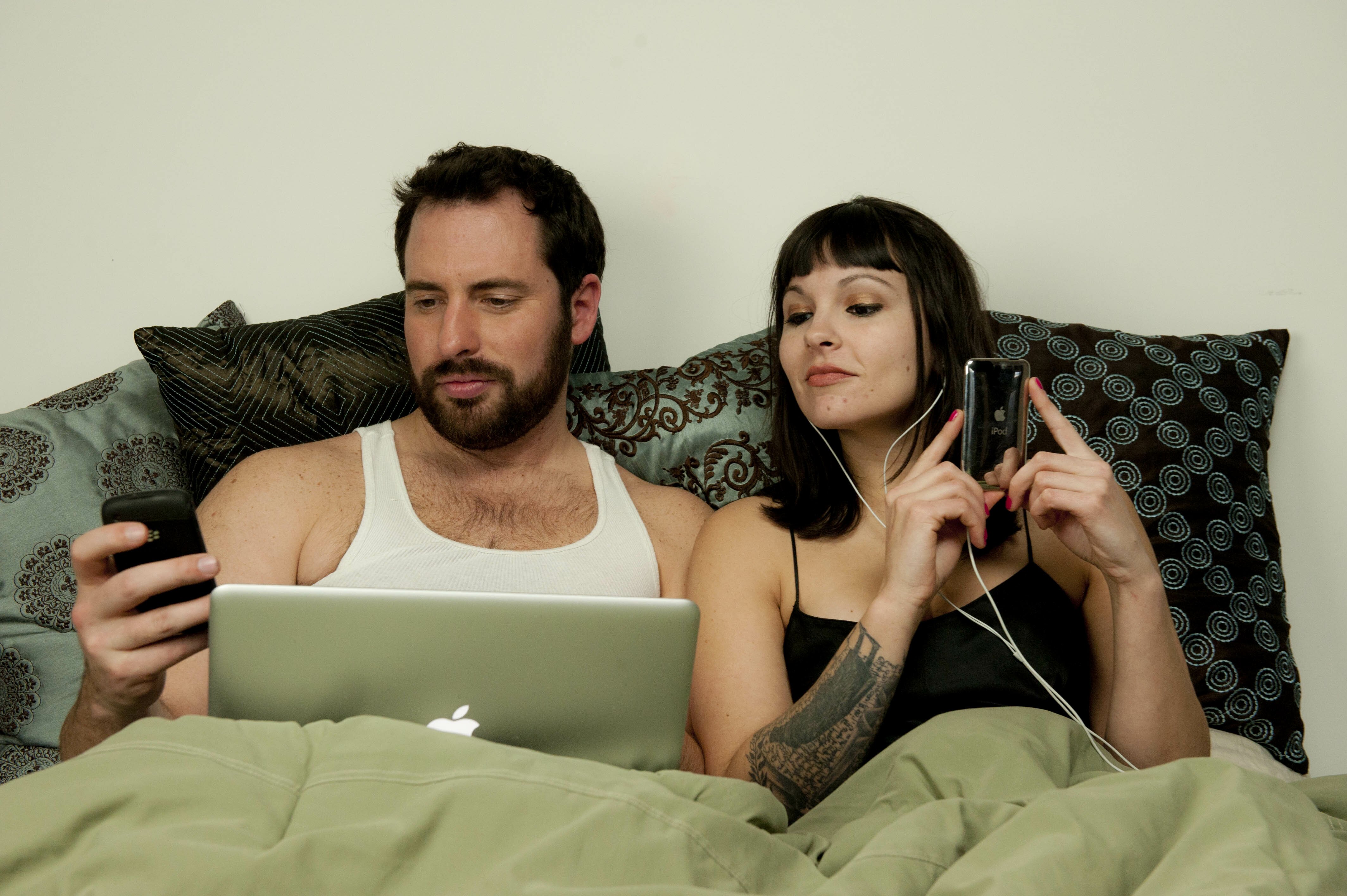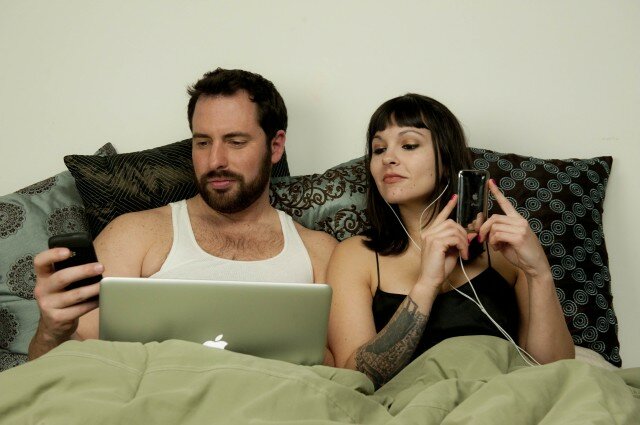The Habit perform Friday 9/16 (8 p.m.) and Saturday 9/17 (8 p.m. and 10:30 p.m.) at the Bathhouse Theater. Tickets!
Seattle’s The Habit were kings of the local sketch comedy scene in the early 2000s. Now, older and wiser and bearded-er, they’ve come together to write their first all-new show in ten years and perform it for two weekends. Weekend the first just passed–earning a rave review from the Seattle Times (and everyone I talked to after the show). This Friday and Saturday are the final shows. Anyhoo, chatted with the guys, including Newly-minted Stranger genius John Osebold and comedy cabaret master Mark Siano, about the past and present of sketch.
1) I know you guys used to do comedy on the same bill as Reggie Watts…what happened to that guy?
John: Now we manage him. He’s our #2 client. After Dale Earnhardt.
Jeff: Conan asked us to perform on his tour with Reggie. I forgot to tell you guys. But I told him no.
John: To his face, I hope.
Mark: I remember those shows. The Habit would take turns farting into a sampler and loop it as a beat. Reggie Watts stole our act.
2) With John being named a Stranger Genius in the middle of your rehearsal process, have you had to change the show at all?
David: We’ve had to learn his name.
John: It’s pronounced “Magical Wonderkind Wizarding Orgasm Machine.”
David: Seriously though, we’ve all worked with Johnny since the mid-’90s, so we’ve gotten to see his genius up close and watch it grow into the amazing life force that it is now. However, many people might be surprised to learn that he can’t rhyme. Doesn’t even understand the concept.
John: But I can’t being the french doors simple put together having I think thoughts regular help me.
3) Can you please describe for The SunBreak audience what it was like trying to break into sketch comedy in L.A.?
Jeff: So, this is an unfair question, because it’s like asking us to dig into a gaping wound. Basically asking, “What did you do wrong?”
And the answer to that (sorry to not have a funny response) is…just about everything. We were obviously unprepared about how much effort we’d have to actually put in. And how “the industry” works, and how to best position ourselves, and what steps to take to increase our likelihood of succeeding. We performed shows for three people. That was humiliating. Plus, we didn’t know as much about comedy as we thought we did. We really weren’t ready to make that leap.
Also, in hindsight, I think it’s wrong to assume that a group can pack up and move to L.A. and find success. To be “successful” (in the Hollywood sense of the word) in L.A. you have to be an individual and a whore. A good whore, I don’t mean that in a bad way. You have to create every opportunity for yourself, and put yourself out there as much as possible, and network nonstop and go to every improv joint or comedy club, and just keep plugging away for years. Luck is about being in the right place at the right time. 99 percent of those individuals will never get a shot. But, 100 percent of groups who pack up and move will never get a shot. L.A. isn’t looking for unknown groups. Groups don’t succeed. You have to prove yourself as an individual comedian, and then you group together with other successfully networked individuals who are themselves proven.
Quick story–to this already too-long answer–when I first moved to L.A., I was doing freelance training for Adobe software. Completely coincidentally, I showed up at a guy’s house to help him with his computer, and it was Ross Shafer of Almost Live! fame. I was flabbergasted. (This was like meeting my idol at the time.) Instead of accepting money from him, I insisted on being paid in advice.
My question to him: Any tips to succeed in L.A.? His answer: “You don’t need to move to L.A. If you have a good product, people will find you. Stay where you are and build a crowd and word will spread if your product is truly good.” (This was two months after packing up and moving. Insert sad trumpet music: “Wah wah wah wahhhhh.”) You know what–he was right. Too bad for us!
David: I would also say you have to work 24/7. You have to meet people and audition and do open mics and perform, perform, perform. You can’t have a real job and try on the side. It has to be what you do, and even then, you need luck. The thing that amazed me was how many funny people there are in L.A. going nowhere. I mean FUNNY, amazingly funny. People performing at Improv Olympic, who just blew the roof off the place every week, and maybe I’ll see one of them in a commercial every once in a while. Whenever they talk about athletes making the jump from college/AA to the majors and getting lost, I know what they’re talking about. I guess if you really want to know what it’s like to make it in L.A., go to a batting cage and try and take a few swings in the 100mph cage.
4) You wrote all-new material for this show. What’s different about comedy writing in the 2010s?
Jeff: We can no longer rely on our bread and butter: Y2K jokes.
Mark: Writing comedy is more difficult now that television is no longer the god of entertainment. If someone suggests a commercial parody, half of us haven’t even seen the commercial in question. You have to be more clever now, and not rely on pop culture to do the funny for you.
Also, now that we rehearse in a mansion and not a crumbling basement in Wallingford, there are a lot of distractions.
John: Like gorgeous sunsets over the Olympics. Thanks a lot, God.
(Apparently the fifth question is for Elijah.–ed.)
 Mark Siano and Opal Peachey have created something weird and sexy (“swexy” riffs Siano) out of their alternate-universe two-online-worlds-colliding cabaret-musical Modern Luv. It was fresh from a well-received run at the Triple Door when I saw its “
Mark Siano and Opal Peachey have created something weird and sexy (“swexy” riffs Siano) out of their alternate-universe two-online-worlds-colliding cabaret-musical Modern Luv. It was fresh from a well-received run at the Triple Door when I saw its “

